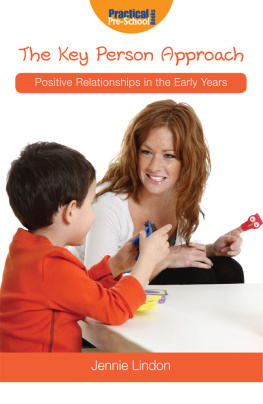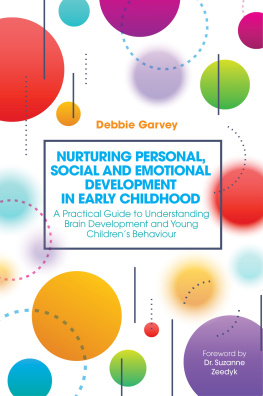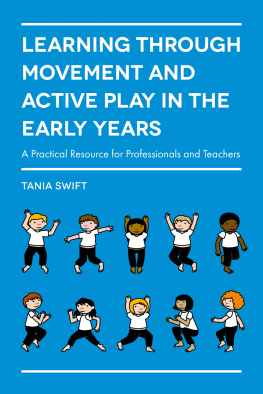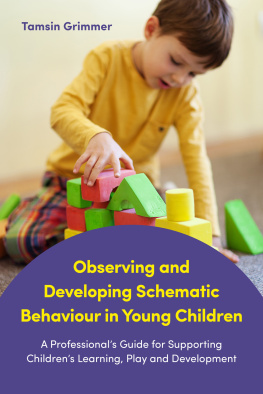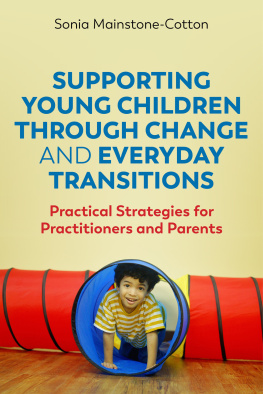Title page

Supporting Childrens Social Development
Positive Relationships in the Early Years
by Jennie Lindon
Copyright page
Published by Practical Pre-School Books,
A Division of MA Education Ltd,
St Judes Church, Dulwich Road,
Herne Hill, London, SE24 0PB.
Tel: 020 7738 5454
www.practicalpreschoolbooks.com
MA Education Ltd 2011. Illustrations by Cathy Hughes. Front cover image iStockphoto.com/Nicholas Monu
Digital version converted and published in 2012 by
Andrews UK Limited
www.andrewsuk.com
All rights reserved. No part of this publication may be reproduced, stored in a retrieval system, or transmitted by any means, electronic, mechanical, photocopied or otherwise, without the prior permission of the publisher.
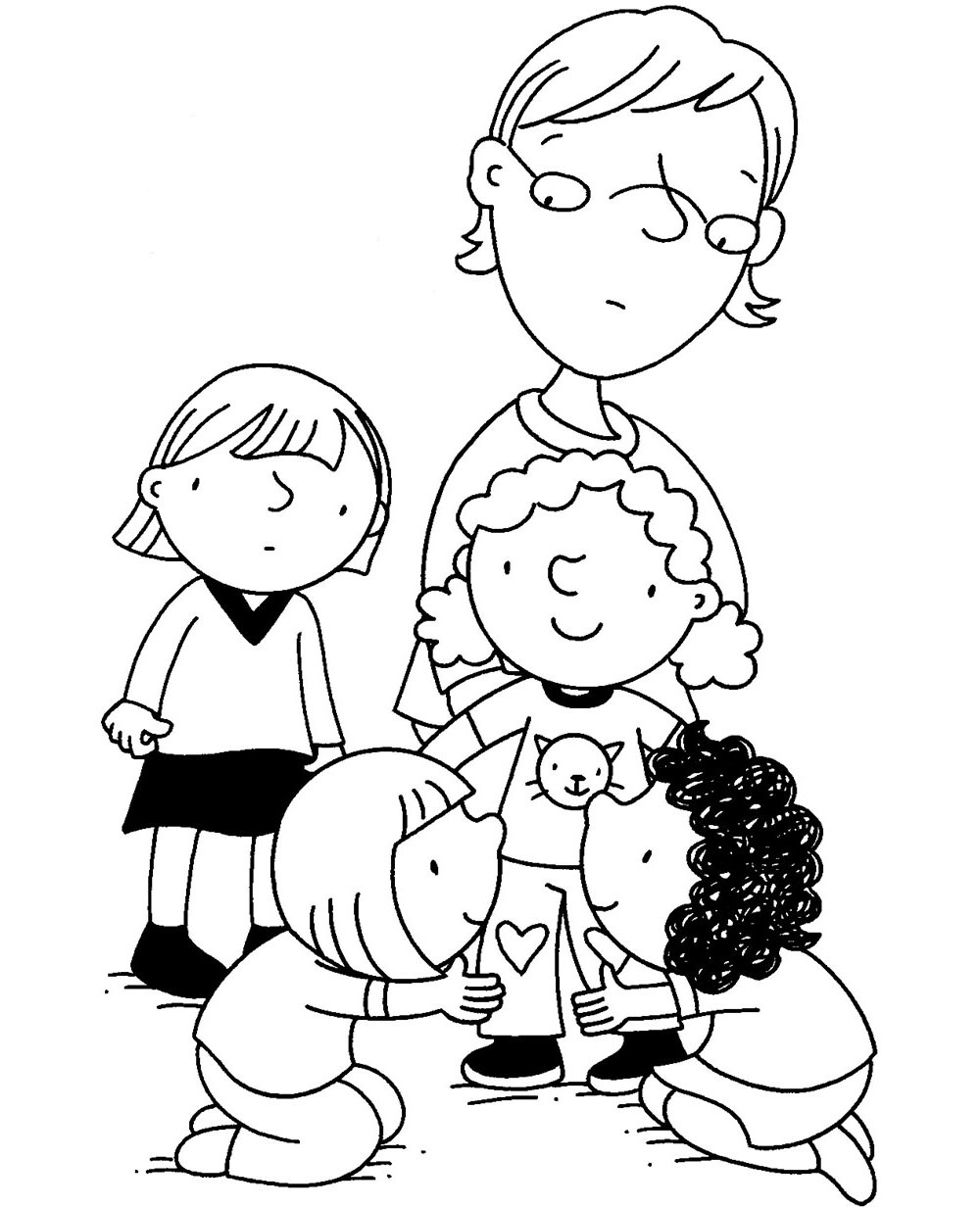
Social development over early childhood
National early years frameworks around the UK give a prominent place to personal, social and emotional development (PSED), including patterns of social behaviour and the growth of empathy. The revised Early Years Foundation Stage (for England) has retained an emphasis on positive relationships through Making relationships. This focus is present in descriptive material about two-year-olds and forms one of the early learning goals for PSED.
All the early years national frameworks imply that thoughtful practitioners, and their provision, will support children. However, there is not much detail about what actually helps babies and children to flourish socially - or what could undermine them. Young children do not make close, personal relationships with other children, unless circumstances are favourable to this development. Positive social development does not just happen. Certainly, adults do not promote friendly behaviour between children, or actual friendships, simply by announcing Were all friends here.
What often seems to be missing in discussions about social development is a strong focus on the perspective of the young child. Best practice has a strong element of looking through childrens eyes about how the seeds of possible friendship are sown and how friendships become strong - or fade. The starting point in looking at childrens social development is grounded in the firm foundations of practitioners knowledge about child development. There are plenty of pointers to help this process, and this section focuses on how babies and young children develop socially.
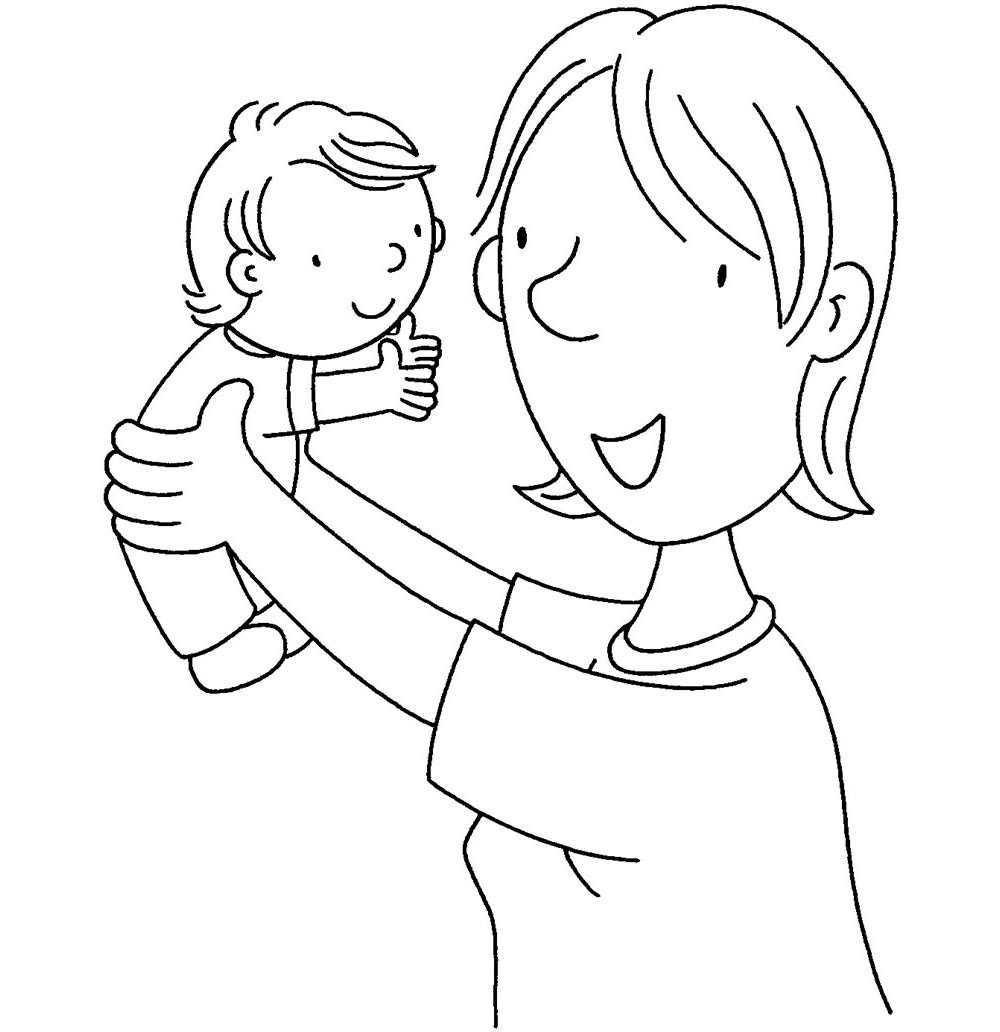
The social baby and toddler
In the normal course of events, babies are born social. Their ears are attuned to the sound of the human voice and their brains are poised to process spoken language. Human infants are physically uncoordinated and they need a huge amount of care in comparison with other very young mammals. They cannot scamper after their family like a little lamb, to insist on social and close physical contact. Instead, human babies use their eyes and other senses like touch to communicate. In particular babies use a steady stare to communicate by locking onto the eyes and face of others. They also use their voice, in communication that steadily moves from crying to a wide range of sounds.
Responsiveness to familiar adults
Throughout the first year of life, babies are responsive to the sounds of familiar adults and children, including their siblings. Parents or early years practitioners should become uneasy when a baby seems unresponsive to a smiling face, affectionate touch or the sounds of human speech. Babies all have their own temperament, and some are by nature more lively in actions and sound making. However, there is good reason to be concerned when babies are unresponsive, rather than simply quiet, or slower to warm up than their peers within a playful exchange with a familiar adult or child.
The crucial beginnings of social interaction are established over the baby year. Babies become ever more social, as the direct result of generous personal attention from a few adults, with whom they become very familiar. Suitable playthings are important for babies, but toys can never in themselves promote sociability in the very young. By the end of their first year, older babies can be active participants in conversational-type exchanges because of all their experiences that support social learning over infancy. They become able to pay attention - looking and listening in the way that older babies and young toddler are able to - with familiar adults. They hold a mutual gaze and use pointing, as well as looking, to direct your attention towards something of interest. In a slightly different way, babies also gain social experiences from affectionate contact with siblings and other slightly older children.
Older babies and young toddlers can have the building blocks for conversation long before they speak recognisable words. The give-and-take of reciprocal communication is an essential part of social contact. Watch nearly one-year-olds, who have had sufficient personal interaction over the baby year. You see the looking, pausing and expectant expression that are just as much part of friendly contact as the sound making and speech-like flow that comes before spoken language.

Links to your practice
Within their own family, babies make active contact with parents and other close relatives. Some babies spend considerable time in non-family care, in a day nursery or the home of a childminder. It is essential that the key person in the group setting, or the childminder, welcomes personal contact with individual babies, developing a close and affectionate relationship with them (Lindon, 2010b). Wherever they spend their days, babies and young toddlers - slightly older children too - need the emotional security that comes from a close attachment to a small number of familiar adults.
In what ways have you explored, and ensured, that your key person approach ensures babies and young children can make a personal, close relationship from which they can then choose to make broader social contacts?

Responsiveness to other children
Very young children do not only make friendly contact with familiar adults. Babies and toddlers show that they recognise familiar peers and, within their physical abilities, engage in social play with individuals. Even the very youngest children are aware of each other and alert adults can see those early social contacts. Babies and very young toddlers, who spend enough time together on a regular basis, get to know each other on a friendly basis. You will see their face light up in recognition and even babies, who are familiar with each other, will stare or put out a hand to touch each other.
Mobile older babies, and definitely toddlers, engage in social play by establishing a joint focus of interest. For instance, they make physical contact with an object that another young child (or an adult) is holding and manipulating. The action communicates non-verbally that Im interested too. There is also a lot of deliberate imitation of what the other child (or the adult) does. This copying action again sends a non-verbal message along the lines of I like this too and How about we do it together?.
Next page

